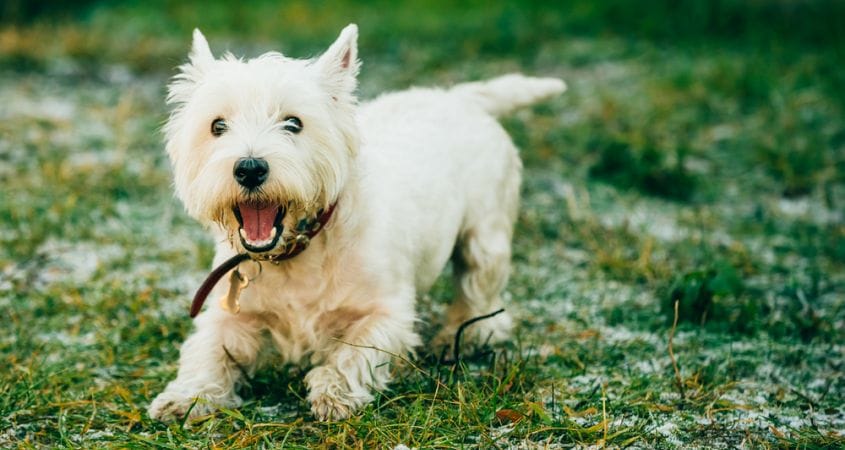Have you been wondering what the most common symptoms of worms in dogs are? Worms in dogs are one of the most common dog health problems and, although the thought of worms in your pup may be unpleasant, it’s important to identify the symptoms of worms in dogs so you can begin treatment right away.
There are five types of worms that generally affect dogs:
- heartworms
- roundworms
- hookworms
- tapeworms
- whipworms
How Can Dogs Get Worms?
Dogs can get worms when they ingest eggs or larvae that they find in feces, soil, or even in fleas that they lick on their own fur. The worm larva will then hatch and attach to your dog’s intestinal wall where it can grow into an adult worm (petmd.com).
The other way a dog might get worms is transmission from mother to pup. Worms can migrate across the placenta during pregnancy or larvae can be ingested by puppies when nursing.
Certain types of worms are easier to spot than others. For example, if your dog picks up a tapeworm, it’s common to see what resembles grains of rice in his stool. Heartworms, on the other hand, are harder to diagnose, and an infected dog will often show only subtle symptoms until the disease has progressed to a more advanced stage.
Below, we’ve put together a list of the most common signs of worm infestation in dogs.
The 11 Most-Common Symptoms of Worms in Dogs
Coughing
One of the most common symptoms of worms in dogs is coughing. Coughing is often a sign of heartworms but can also be a symptom of hookworms and roundworms.
Dogs with heartworms will have a dry and persistent cough, unlike a normal cough that is strong and infrequent. During the early stage of heartworms, your dog may cough after exercising. This is because the heartworm parasites are migrating into the lungs, thus creating a blockage of oxygenated blood.
Similar to heartworms, dogs with roundworms will begin coughing as the roundworm larvae migrate to the lungs. As for dogs with hookworms, coughing will be a symptom only if the case is severe.
If your dog is coughing more frequently and weakly, it’s important to consult a vet immediately. Many cases of worms in dogs can be very serious and sometimes even fatal.
Vomiting
If your dog is vomiting, it may be a symptom of worms. Each type of worm is known to cause vomiting. Dogs with whipworms may vomit a yellow-green substance while dogs with roundworms, hookworms or tapeworms may vomit visible worms. In most cases, you’ll be able to see the worms in your dog’s vomit.
Keep in mind, however, that vomiting can be triggered by other health issues such as indigestion. If your dog begins vomiting frequently, contact a veterinarian immediately. Even if your dog doesn’t have worms, vomiting may be a sign of another health problem.
Diarrhea
Soft stools and canine diarrhea can be the result of worms. Prolonged diarrhea can lead to dehydration, which is why it’s very important to visit a vet immediately.
In addition to diarrhea, dogs with hookworms may have blood in their stools. Bloody diarrhea develops as the infection worsens and may cause chronic bloody diarrhea if left untreated.
Blood loss is a serious risk for dogs infected with worms. It is especially dangerous for dogs with heartworm. Too much blood loss can result in lethargy, extremely high blood pressure and possibly heart failure. If you notice blood in your dog’s stool, contact your vet immediately.
Low energy
Dogs that are lethargic and less active than normal may be showing symptoms of worms. The worms cause this lack of energy by taking blood and nutrients from your dog.
The hookworm is a common parasite that is dangerous enough to kill puppies due to the loss of blood. Even in adult dogs, blood loss can be life-threatening if not treated quickly. If your dog is low on energy or acting weak, you should promptly consult a vet.
Pot-bellied appearance
Another common symptom of worms in dogs is a pot-bellied or bloated appearance. Roundworms is the most common type of worm to cause this symptom.
A pot-bellied appearance is usually seen in puppies who have picked up worms from their mother. This transmission of worms happens either prior to birth through the placenta or after birth during nursing.
Puppies aren’t the only ones who develop this symptom. Adult dogs may have a pot-bellied appearance as well. Regardless of your dog’s age, you should visit a vet immediately, as roundworms can create blockages in your dog’s intestines.
Change in appetite
If you notice a sudden change in your dog’s appetite, he may have come into contact with roundworms. Dogs that are infected often lose their appetite or, in some cases, have a sudden increase in hunger.
Even though your dog may have increased appetite levels, he may still lose weight. As with the other symptoms of worm infestation in dogs, you should visit a veterinarian as soon as your dog shows changes in appetite.
Weight loss
If your dog shows signs of rapid weight loss, he may have a tapeworm or whipworm. This is due to the parasites feeding on the nutrients in your dog’s stomach. As previously mentioned, weight loss can occur even if your dog’s appetite is normal or increased.
Keep in mind, however, that weight loss may also be a sign of other health issues. Always consult a vet if your dog is experiencing drastic weight loss.
Dull coat
A healthy dog should have a shiny thick coat. If your dog’s coat begins to dull and dry out, he may have picked up a form of worms. Loss of hair or the appearance of rashes can also denote worms.
In addition to a dull coat, your dog may experience significant hair loss. There are many types of parasites besides worms that can cause hair loss, so consult your vet to find the right treatment.
Itching and signs of skin irritations
Dogs that show signs of skin irritation may have a severe infestation of worms. Such skin irritations may include a rash. You may even see your dog itching himself more often.
This leads us to the next symptom of worms in dogs, which is rubbing his bottom on the floor.
Rubbing its bottom on the ground or “scooting”
Although scooting can often be caused by problems with the anal glands, dogs with worms will occasionally rub their rear ends on the floor in order to relieve themselves of the itch due to worms in the area. Additionally, your dog may bite or lick his bottom to relieve the itching that the worms cause.
Visible worms in fur or fecal matter
Some worms, such as tapeworms, may appear as small moving segments in the fur or area around your dog’s anus. Roundworms can often be seen in a dog’s stools. These worms most likely will look like moving pieces of rice or, if they are dry, they’ll look like hard yellow specks.
Treatment of Worms in Dogs
If left untreated, worms can damage your dog’s internal organs and lead to loss of consciousness and death. If you suspect that your dog has worms, take it to your nearest veterinary office.
Most intestinal worms are easy to treat and your veterinarian will prescribe a medication based on the diagnosis. Treating heartworm disease, however, can be expensive and may require injections that cost between $500 – $1,500 (petmd.com).
Was your dog ever diagnosed with heartworms? How did you treat it? Tell us in the comments.











